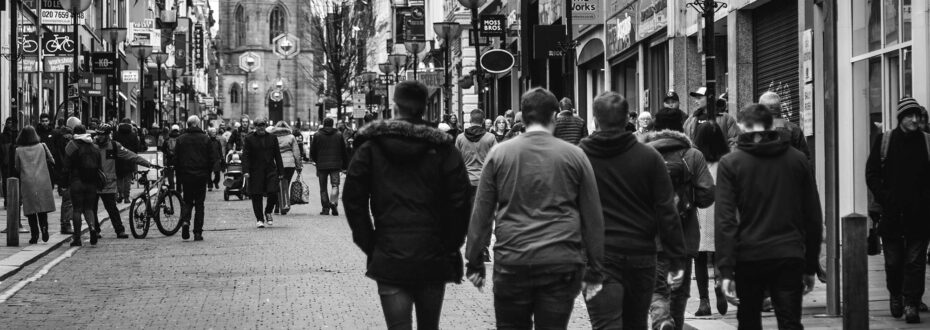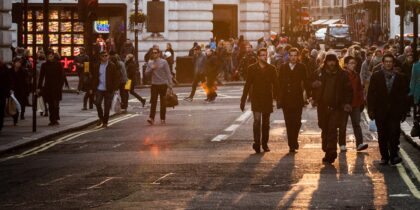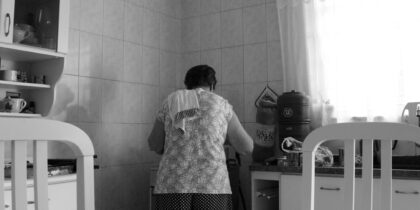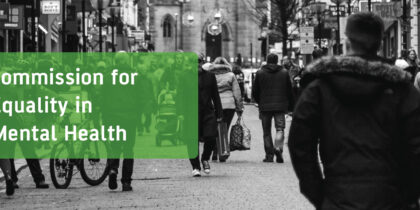Stark inequalities in mental health can be reversed with concerted action from national and local government, public services and civil society, according to a landmark report published today by Centre for Mental Health.
Mental Health for All? is the final report of the two-year Commission for Equality in Mental Health, chaired by Liz Sayce and hosted by Centre for Mental Health. It says that inequalities which have for too long been accepted or ignored can be reduced through concerted action nationally and locally.
Mental Health for All? finds that mental health inequalities mirror wider economic and social inequalities. Wealth and power inequalities put at risk the mental health of people experiencing poverty, racial injustice, discrimination, violence and abuse. This creates sharp social divisions, meaning that many groups of people face two or three times the risk of mental ill health. Yet the same groups of people find it harder to get help for their mental health, and in some cases also get poorer outcomes when they do.
The report also finds that the Covid-19 pandemic has brought health inequalities that were always there into sharper view, sadly with tragic consequences. But it also gives our society a chance to rebuild with a clear view to mental health equality.
Mental Health for All? sets out a ten-point plan for mental health equality. It calls on the Government to reduce mental health inequality, including by reducing the high levels of inequality of wealth and income in the UK, which damage mental health; and by giving a stronger equality duty to public services. It calls for a boost to local government funding to lead local action towards mental health equality in partnership with community groups. It calls for long-term commitment in the NHS to its recent Advancing Mental Health Equalities strategy. And it calls on businesses, charities and other civil society organisations to become mental health equality allies: for example by improving working conditions and investing in community action to close the gaps.
Commission for Equality chair Liz Sayce said: “Mental health inequality is a stain on our society. But it does not have to be this way. Inequality is not simply a fact of life. Through concerted action it can be changed.
“Our call to evidence unearthed a wealth of examples of people acting to change this picture: from grassroots community-led work successfully engaging people who don’t trust mental health services, to systemic partnerships between civil society and statutory agencies to shift the way services are planned and delivered. But many of these approaches are isolated, often small scale and short-term.
“People directly affected by inequalities have spoken powerfully within and with our Commission. Their voices, views and activism are essential to guide developments, locally and nationally. One of the impacts of inequality is powerlessness and we want to replace that powerlessness with strong leadership of lived experience, and with accountability that puts organisations at the service of communities.”
Commission member Cllr Jacqueline Dyer said: “Mental health inequality affects communities and families across the country and it costs lives. The NHS has now adopted a new strategy, Advancing Mental Health Equalities, and a Patient and Carer Race Equality Framework for mental health services. They can make a big difference to people’s lives. But they must be matched by a wider commitment to tackle the causes of mental health inequality and injustice.”
Centre for Mental Health chief executive Sarah Hughes said: “Mental health inequalities are not new, and nor are reports about them. So today we want to prompt action, not more words. It’s time to say enough is enough. The pandemic has brought mental health inequalities into the open.
“So it is vital we take action to close the gaps. That means investing in early years services to help families give children a good start in life. It means paying workers a Living Wage and making the benefits system work better. It means creating inclusive schools and colleges where everyone feels safe and accepted. And it means ending ‘hostile environment’ policies, improving housing and tackling homelessness.
“Our recommendations will all help to reduce mental health inequalities nationwide. It will take a clear and consistent commitment to close the gaps. But we cannot go on ignoring mental health inequalities. It’s time to act.”
Facts and figures:
- Children from the poorest 20% of households are four times as likely to have serious mental health difficulties by the age of 11 as those from the wealthiest 20% (Morrison Gutman et al., 2015)
- Children and young people with a learning disability are three times more likely than average to have a mental health problem (Lavis et al., 2019)
- Men and women from African-Caribbean communities in the UK have higher rates of post-traumatic stress disorder and suicide risk, and are more likely to be diagnosed with schizophrenia (Khan et al., 2017)
- 70% of children with autism (Simonoff et al., 2008) and 80% of adults with autism (Lever and Geurts, 2016) have at least one mental health condition (Autistica evidence to the Commission)
- Women are ten times as likely as men to have experienced extensive physical and sexual abuse during their lives: of those who have, 36% have attempted suicide, 22% have self-harmed and 21% have been homeless (Scott and McManus, 2016)
- Deaf people are twice as likely to experience mental health difficulties (All Wales Deaf Mental Health and Well-Being evidence to the Commission)
- People who identify as LGBT+ have higher rates of common mental health problems and lower wellbeing than heterosexual people, and the gap is greater for older adults (over 55 years) and those under 35 (Semlyen et al., 2016).
- Half of LGBT people (52%) said they’ve experienced depression in the last year. One in eight LGBT people aged 18-24 (13%) said they’ve attempted to take their own life in the last year. Almost half of trans people (46%) have thought about taking their own life in the last year, 31% per cent of LGB people who aren’t trans said the same (Bachmann and Gooch, 2018).
- Older adults (over the age of 65) account for only 7% of people who use NHS Improving Access to Psychological Therapies (IAPT) services (NHS England, 2017)
- People living in more deprived areas of England are more likely to be referred to an IAPT service by their GP but are substantially less likely to receive a complete course of treatment (Hodgson, 2019) or to make a successful recovery (Baker, 2020).
- Recovery rates in IAPT services are lower for bisexual people (43%) and lesbian and gay people (49%) than for those identifying as heterosexual (53%) (NHS England, 2020).
- Almost one in four LGBT people (23%) have witnessed discriminatory or negative remarks against LGBT people by health care staff, and 14% of LGBT people have avoided health treatment because of worries about discrimination.






